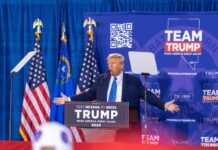
Amid escalating concerns over data privacy and national security, most U.S. voters now support a federal ban of the Chinese-owned social media platform TikTok. A recent RMG Research poll reflects the growing unease about the influence of foreign technology — especially involving the Chinese Communist Party (CCP) — on the daily lives of Americans.
According to the poll conducted on December 18-19 among 1,000 registered U.S. voters, 54% support a nationwide prohibition of TikTok. The poll results come as 34 states have already restricted the app on government devices. The trend is toward more robust support for extending the ban on personal devices storing and transmitting immense amounts of sensitive data. A substantial majority of those over 65, at 69%, and a surprising 43% of adults under 34 favor a nationwide ban of TikTok on all devices.
Americans turn on TikTok: 54% support banning social media app https://t.co/VgkUgU4Jzz
— Bo Snerdley (@BoSnerdley) December 21, 2023
Owned by Beijing-based ByteDance, TikTok has faced repeated allegations of being a tool for the CCP to exploit American user data. Federal Communications Commission official Brendan Carr has detailed the inherent risk involved with the app sending U.S. user biometrics to China.
Other tech experts have shown that TikTok is capable of logging user keystrokes and pushing narratives promoted by the Chinese communists on American users, especially the younger population that uses the app extensively. A Generation Lab survey cited a disturbing correlation between TikTok usage among young adults and the rise in antisemitic beliefs, particularly in the context of the Israeli-Hamas conflict.
Sen. Josh Hawley (R-MO) has been a leading advocate for cracking down on TikTok’s outsized influence on American youth, describing the app as nothing less than the leading “news aggregator” for younger Americans. He notes that in the digital age, the entire battle for the hearts and minds of young citizens is being fought on various social media platforms.
Most US voters support total federal TikTok ban: Poll | Just The News https://t.co/qXaEo5lEnl
— John Solomon (@jsolomonReports) December 26, 2023
TikTok’s response to these accusations has been a mix of denial and public relations efforts. A spokesperson for the platform refuted claims of bias in content recommendations, emphasizing that their community generates content without external influence. However, this assurance does little to assuage concerns that the app’s algorithm may prioritize polarizing and extreme content, a strategy eerily reminiscent of the CCP’s propaganda tactics.
In response to these growing concerns, bipartisan efforts are underway to curtail TikTok’s reach in America. Sen. Hawley has been vocal about the need for legislative action against the app, describing it as a backdoor for the CCP into Americans’ private lives.
Likewise, Rep. Mike Gallagher (R-WI) has called for a Congressional ban, drawing attention to the stark difference between TikTok and its Chinese counterpart, Douyin, which promotes educational content and limits usage.
With a substantial portion of the American population backing a federal ban and lawmakers on both sides of the aisle acknowledging the potential threat, TikTok’s future in the U.S. remains uncertain as the critical 2024 elections rapidly approach.




























